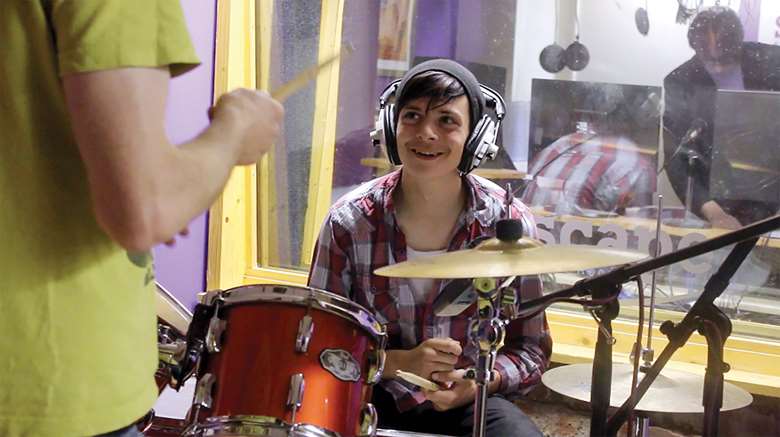Music in Mind
Emily Rogers
Tuesday, January 30, 2018
Uses music-making to increase young people's self-expression and reduce anxiety and isolation.

- A music tutor from charity Rhythmix works with a mental health professional, who supports social interaction and emotional needs
- More than 1,000 young people have been supported so far
ACTION
Rhythmix, a charity aiming to transform the lives of vulnerable people through music making, has been working with 11- to 25-year-olds with mental health issues since partnering with child and adolescent mental health services (CAMHS) in East Sussex in 2008. Music in Mind has now engaged more than 1,000 young people across Sussex, Surrey and Kent, through partnerships with seven NHS organisations. Funders include Comic Relief, Youth Music, Amy Winehouse Foundation and National Lottery Awards for All.
Music in Mind - winner of the Mental Health and Wellbeing category at the 2017 CYP Now Awards - involves a Rhythmix tutor guiding a group through music-making, working alongside a mental health professional from a referral organisation. It aims to increase participants' self-expression and reduce anxiety and isolation.
"We use music to build a bridge with someone," explains strategic director, Lucy Stone. "This helps young people build connections with their families, healthcare workers and others."
Groups don't usually exceed eight, meeting weekly for two hours for a term or longer. Tutors build sessions around participants' needs, skills, motivations, goals and interests. They work one-to-one where needed, but encourage participants to take the lead through repertoire and improvisation, usually resulting in at least one jointly-written song performed within the group, at events or online.
The mental health professional supports participants' emotional needs and social interaction. In East Sussex, the council's Early Help Key Work Service refers participants, alongside CAMHS and others. Rivkah Cummerson, participation and engagement manager for East Sussex CAMHS, says songwriting gives participants an outlet to express difficult experiences and emotions they may otherwise struggle to articulate, adding that once they realise they're not alone, "it can start to alleviate some of the symptoms".
"Music puts distance between young people and their experiences, which can otherwise feel overwhelming," she explains. "One young person may voice what another wants to say, but can't. Doing it collaboratively helps them say something they couldn't before. They can bring that back to their clinician, who helps them make sense of it."
Cummerson says the project aids recovery of those who have missed long periods of school and are feeling "really de-skilled" by mental health difficulties, helping them realise "it's not learning they struggle with".
Music in Mind also runs at Chalkhill, an acute adolescent mental health hospital. Weekly sessions are supported by an occupational therapist and offered to all patients as part of their therapeutic timetable, helping them towards goals including rekindling musical interest, resuming a routine, developing confidence and self-esteem, boosting social and communication skills, and finding new outlets for expression.
Lisa Craig, the occupational therapist co-ordinating Chalkhill's day service, says sessions provide therapists with "really useful information about people's functioning", to feed into weekly, multi-disciplinary meetings informing care plans. "The sessions bring out different things in people that a lot of the team wouldn't see, which can be vitally important," she explains.
IMPACT
Survey responses from participants across several projects show all stating they had enjoyed the programme and learned new skills, with 86 per cent feeling a sense of achievement. The proportions who said they felt able to be themselves, express ideas and opinions, and thoughts and feelings through music-making were 71, 86 and 79 per cent respectively.
Ashton, aged 17, who attends the project's Eastbourne group, where he sings, writes songs and plays the bass guitar, says it has revived his passion for music, which he is now studying at college. "Without this, I don't think I'd be where I am educationally, or in the state of mind to keep myself going," he says. "Improvising allows us to express and let go of things stressing us out, relieving anxiety and struggles."
Ashton's diagnoses include post-traumatic stress disorder, which he says led him down a "dark path into depression, anxiety and drug-induced psychosis". "Without support from CAMHS, especially Music in Mind, I don't think I'd still be alive," he says. "In my darkest days, I get out of bed because that group's given me something to focus on."




